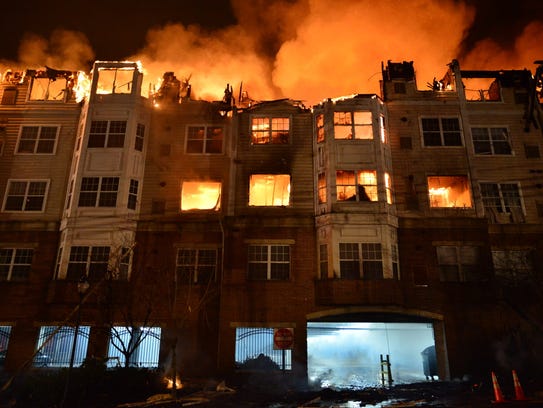Friday, April 7, 2017
EDGEWATER, New Jersey (WABC) -- Following a devastating apartment complex fire in Edgewater more than two years ago, New Jersey lawmakers are working to make future construction safer.
Two bills have been introduced in the New Jersey State Assembly that are aimed at improving fire safety and building construction codes.
The proposed legislation would increase sprinklers in concealed combustible spaces and limit the use of lightweight wood construction.
"Without this, as you saw here in Edgewater, there is no chance," Bergen County Executive Jim Tedesco said. "So that's why it's so important to get this legislation moving quickly."
The January 2015 fire left hundreds of people at the Avalon apartment complex homeless. Officials said the fire spread so quickly and was virtually unstoppable because the building was made of lightweight materials with no firewalls.
However, with a recent six-alarm blaze at another AvalonBay property in Maplewood back in February, some people are still questioning if these changes will be enough.
As reconstruction continues at the Avalon in Edgewater, where they are already implementing some of the proposed changes, lawmakers hope the new bills will receive approval by the end of May.
"It's been a long time coming," Edgewater Mayor Michael McPartland said. "I think it's something that should be done I think it makes common sense."
We believe that even these measures are not enough to prevent similar catastrophes. The Avalon fire could have been minimized if the firefighters acted early and with massive water force. But they did not. Instead, they spend valuable time trying to get people out of the Avalon apartments, while the fire was spreading. They then decided to fight the fire in the perimeter! These were amateur firefighters and you could see them siting around and doing nothing. Not to mention that there was not enough water to go around!
==================
Two years after a devastating fire ripped through a large Edgewater apartment complex and destroyed the homes of some 500 people, Assembly Speaker Vincent Prieto has introduced legislation intended to better protect residential buildings from fast moving blazes that can feast on wood construction.
The Democratic lawmaker from Secaucus, who is also a construction code official, appeared at the Edgewater Community Center on Friday alongside Bergen County Executive Jim Tedesco and Edgewater Mayor Michael McPartland, who spoke of the urgent need for two bills related to fire safety that Prieto quietly introduced last month.
“While we cannot prevent fires from starting, there are things we can do to prevent the spread of fire,” said Tedesco, a former firefighter who demanded fire safety reforms in his State of the County speech in February. “Together, these changes to the construction code will not only save lives of the residents in the event of a fire, but they’ll also save the lives of our firefighters and other first responders.”
Many NJ residents exposed to risk of Edgewater-style fire
Politicians, fire safety experts and citizen activists have been calling for changes to the state’s building code since Jan. 21, 2015, when an unlicensed maintenance worker using a blowtorch lit a piece of insulation on fire in the wall at the Avalon at Edgewater apartment complex on River Road.
What happened next, they say, proved New Jersey’s building code to be deficient. The flames were able to spread rapidly through the entire 240-unit building and, despite the efforts of first responders from more than 40 agencies, reduced everything but the concrete elevator shafts to rubble.
“We basically had an area the size of a city block engulfed in flames in a very, very, very short period of time,” McPartland recalled Friday. “Even though the apartment complex was equipped with sprinklers, the place literally burned to the ground and the residents lost everything they had.”

Edgewater Mayor Michael McPartland, Assembly Speaker Vincent Prieto (D-Bergen/Hudson) and Bergen County Executive Jim Tedesco announce new legislation to improve fire safety at multi-unit dwellings. (Photo: Viorel Florescu/NorthJersey.com)
‘A very small price to pay’
Prieto’s first bill, A-96, which is co-sponsored by assemblymen Tim Eustace, D-Maywood, and Joe Lagana, D-Paramus, responds to a few key concerns that were raised in the wake of the Edgewater fire.
First, it would mandate that all concealed combustible spaces in wood-frame multi-unit residences — the type of buildings that thousands of New Jerseyans call home — be equipped with some sort of automatic fire-suppression system.
Currently, New Jersey’s building code doesn’t require sprinkler heads in such places as attics or the void spaces in floors and ceilings. In the case of the Avalon at Edgewater complex, that meant there was nothing to knock down the fire as it traveled through the building’s attics, walls and floor assemblies.
Second, the bill would tamp down on the use of “pedestal construction” by developers. Typically, those are parking garages on which residential units are built that allow them to construct buildings with more floors than would otherwise be permitted under the code.
Firefighters say pedestals make it harder to reach flames and can put residents on upper levels out of reach of first-responders.
Third, the bill limits the size of wood-frame buildings without a robust fire suppression system to two floors and 10,000 square feet per floor. Any developer who wants more square footage would have to install masonry fire walls between attached buildings.
That provision is intended to constrain how large any one fire can grow.

Flames consume the Avalon at Edgewater apartment complex Jan. 21, 2015. (Photo: Marko Georgiev/NorthJersey.com)
Prieto described the measure as a middle-of-the-road approach that achieves enhanced fire protection while minimizing the impact on construction costs. He estimated that the new sprinkler mandate would cost developers about $1,000 per unit.
“That is a very small price to pay to be able to get this additional protection,” he said. “We have left in place for them to be able to build the right density and be able to keep building affordable housing.”
‘They’re playing the politicians’
But several people in attendance Friday said Prieto’s legislation doesn’t go far enough.
Edgewater Fire Chief Thomas Jacobson said he had hoped the bill would restrict the use of engineered wood — commonly referred to as “lightweight wood” — in residential buildings like the Avalon complex. Developers often prefer engineered wood because it’s cheaper and faster to assemble, but it also burns and collapses faster in the event of a fire.
“I still would rather see noncombustible materials used in buildings of that magnitude, you know, concrete, steel, something that’s not going to burn,” he said. “But at least the ball has started to be pushed in the right direction.”
Alexi Assmus, a citizen activist from Princeton who manages a Facebook groups called Massive Fires Damage Lives, criticized the bill for continuing to permit the construction of “mega-lot buildings” that, in the event of a fire, can result in multiple homes being consumed.
“The bill protects life safety, but it still doesn’t protect the loss of hundreds of homes in a single fire start,” she said. “You could still have a huge conflagration.”
She also dismissed the notion that lawmakers need to be so sensitive toward the building industry when crafting fire safety legislation. A recent state Supreme Court ruling that municipalities have to clear the way for the construction of tens of thousands of affordable housing units for low- and moderate-income residents, she said, is enough of a boon for developers.
“They’re able to build these very high-density apartments with combustible construction,” she said of New Jersey’s developers. “And everyone says, ‘Oh, affordable housing, we can’t do anything.’ They’re playing the public. They’re playing the judges. They’re playing the politicians.”
The second bill Prieto announced Friday, A-97, would require a fire safety expert to monitor any construction site where multi-unit residential buildings like apartments or hotels are being built.
Advocates have called for so-called “fire watches” in light of recent fires at an apartment complex under construction in Maplewood and elsewhere across the country.
June target for passage
Prieto, who works as a construction code official in Secaucus and Guttenberg, took more than two years from the time of the Edgewater fire to propose changes to New Jersey’s building code, saying he has been working for months to earn the buy-in of various interest groups and officials. Nonetheless, one of the bills he announced Friday was nearly identical to a measure, A-1914, that has been pending in the Legislature since December 2015, when it was introduced by Assemblyman John Wisniewski, D-Middlesex.
Prieto said he intended to get both his bills through the Legislature by the end of the fiscal year on June 30.
“This is a bill that I think will have overwhelming support in the Assembly, and the Senate will follow suit,” he said.
We believe that even these measures are not enough to prevent similar catastrophes. The Avalon fire could have been minimized if the firefighters acted early and with massive water force. But they did not. Instead, they spend valuable time trying to get people out of the Avalon apartments, while the fire was spreading. They then decided to fight the fire in the perimeter! These were amateur firefighters and you could see them siting around and doing nothing. Not to mention that there was not enough water to go around!






